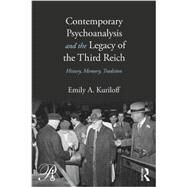- ISBN: 9780415883191 | 0415883199
- Cover: Nonspecific Binding
- Copyright: 8/6/2013
During the 1930s and 1940s, European psychoanalysts held fast to their professional identities despite a profoundly destabilizing reality. From Budapest to Paris the Nazis disrupted the work of this group and threatened their very lives. That psychoanalysis endured, and even flourished in postwar Europe and the Americas, is itself remarkable. And yet, in the end, the 20thcentury belonged as much to Freud as it did to Hitler. This book begins to explore the myriad ways in which theory and praxis and thus the course of psychoanalysis has been and continues to be influenced by this history. Failures in mourning, the plight of the émigré, identifications both with victims and victimizers, as well as efforts to confront and integrate the personal and professional, are addressed via interviews with such prominent analysts as Otto Kernberg, Martin Bergmann, Anna Ornstein, Jack Drescher, and others, all of whom lived through or are descendants of the Holocaust.






